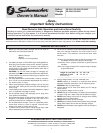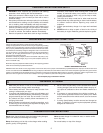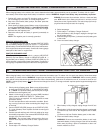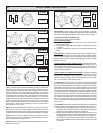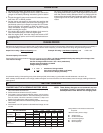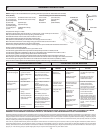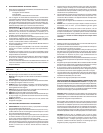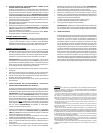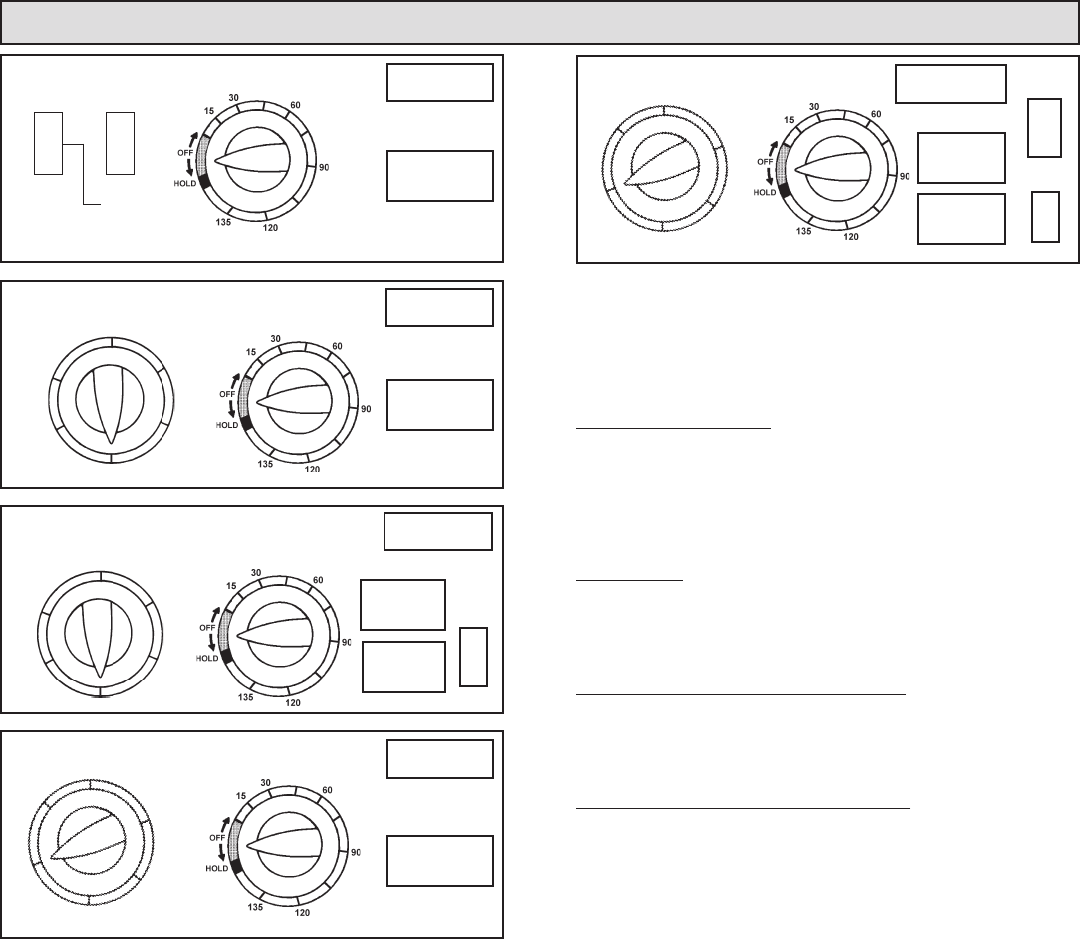
4
H. OUTPUT SELECTOR CONTROLS
TIMER: The main function of the timer is to prevent over charging while
allowing a battery time to obtain a satisfactory charge. To properly set
the timer you must know the size of the battery in ampere hours or
reserve capacity in minutes and the state of charge. Often the state of
charge is not known, this is one reason why the timer was limited to
2.25 hours. With the aid of a battery load tester the state of charge can
be obtained within a few seconds. For example, the average size auto-
motive battery at a 50% state of charge will require 1 to 1.5 hours of
charging at the 40 amp rate to reach the full charge state. For the same
battery with the timer set to it’s maximum, 2.25 hours, over charging
will occur, but not likely cause harm to a battery that was other wise in
good condition. When the charge state is not known, start out with a
timer setting of 1 hour or less.
HOLD This position defeats the timer function, allowing for continuous
operation. Use when you want to charge more than 2.25 hours. This is
normally the case when the 2 amp charge rate is selected. Be sure to
monitor the charging and stop the charge when the battery is charged.
Switch #1 use this switch to select the 200 amp engine start and the
40 amp charge rate. Switch #2 must be in the down position (40amp /
200 amp select) when using switch #1.
Switch #2 Use this switch to select the 2 amp charge rate. Also use to
select use of switch #1.
Rotary switch - Use the rotary switch (volt / rate selector, on all mod-
els except the SE 2001) to select the charge rate or engine start setting
you require. Read the switch dial for those available on this charger.
Load Tester Switch (on SE 8050 only)
Use this switch to apply load to the battery.
Follow these easy steps:
1. Select the correct setting of the meter ( 6v or 12v ) to agree with the
battery to be tested.
2. Connect the charger leads to the battery following the instructions
in section F.
3. Press the Load Switch to load on for 10 seconds and read the volt-
meter.
Good (green)
- indicates the battery capacity is OK. Battery may or
may not be fully charged. Check the specific gravity of battery to deter-
mine the state of charge. If the specific gravity is less than full charge,
check for electrical drain or possible charging system trouble. Recharge
battery to full level.
Yellow or Red, but needle remains steady
- indicates that the bat-
tery capacity is not satisfactory. Battery may be either defective or not
fully charged. Check specific gravity to see which condition exists. It
charging does not bring the battery specific gravity to full charge, the
battery should be replaced.
Yellow or Red, but needle remains falling
- indicates the battery
may be defective or run down. Release the load switch and note volt-
meter reaction. Voltage recovery into green or above within seconds
indicates a defective battery. Slow recovery indicates run down condi-
tion. For best results, check specific gravity.
The Ammeter indicates the amount of current measured in amperes
that is being drawn by the battery. For example, In the 40 amp charge
rate a typical discharged battery will initially draw approximately 40 amps.
As the battery continues to charge, current will taper to 15 to 20 amps
at full charge. The Start area of the meter indicates a high rate of cur-
rent being drawn from the charger. When cranking an engine, the starter
motor draws upwards to 200-300 amps. The meter needle will be at the
extreme right side of the start area. Sometimes a battery for the first
few minutes of it’s charge will draw more than 40/60 amps, in this case
the needle may be within but not to the extreme right side of the start
area. The 2 amp charge rate (on some models) may indicate some
activity on the meter. The meter doesn’t have the resolution to display
this low rate.
The Voltmeter indicates the voltage at the battery terminals. Note that
Model SE 4022 is not a Load tester, but a voltmeter. Use as follows:
1. Charger need not be plugged into AC outlet. Timer should be in the
Off position, 6v/12v switch in position to match battery being tested,
and then connect following instructions in Section F.
2. Observe the meter indication. Keep in mind that this reading is only
a battery voltage reading, a false surface charge may mislead you.
We suggest that you turn on your headlamps for a couple of min-
utes before you read the meter. Read a couple of minutes after you
have shut the headlamps off, then follow the convenient color code
of the meter.
BATTERY
TEST
6 VOLT
12 VOLT
BATTERY
TEST
LOAD ON
6 VOLT
12 VOLT
Ammeter
Voltmeter
SE 8050
SE 2001
SE 4020
Ammeter
Ammeter
SE 6030
Ammeter
CHARGE RATE CHARGE TIME/MINUTES
200 amp start 2 amp
40 amp 40 amp
200 amp
VOLT/RATE SELECTOR CHARGE TIME/MINUTES
VOLT/RATE SELECTOR CHARGE TIME/MINUTES
SE 4022
Ammeter
Voltmeter
#1
#2
12 VOLT
MAINTAINER
6 VOLT
40 AMP/
100 AMP
START
OFF
12 VOLT
40 AMP
12 VOLT
200 AMP
START
12 VOLT
10 AMP
6 VOLT
50 AMP
OFF
12 VOLT
50 AMP
12 VOLT
225 AMP
START
12 VOLT
2 AMP
12 VOLT
300 AMP
START
12 VOLT
30 AMP
OFF
12 VOLT
60 AMP
6 VOLT
30 AMP
VOLT/RATE SELECTOR CHARGE TIME/MINUTES
6 VOLT
60 AMP/200 AMP
START
12 VOLT
300 AMP
START
12 VOLT
30 AMP
OFF
12 VOLT
60 AMP
6 VOLT
30 AMP
6 VOLT
60 AMP/200 AMP
START
VOLT/RATE SELECTOR CHARGE TIME/MINUTES
12 VOLT/10 AMP
6 VOLT/125 AMP START



